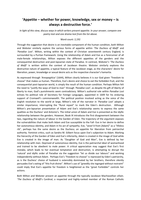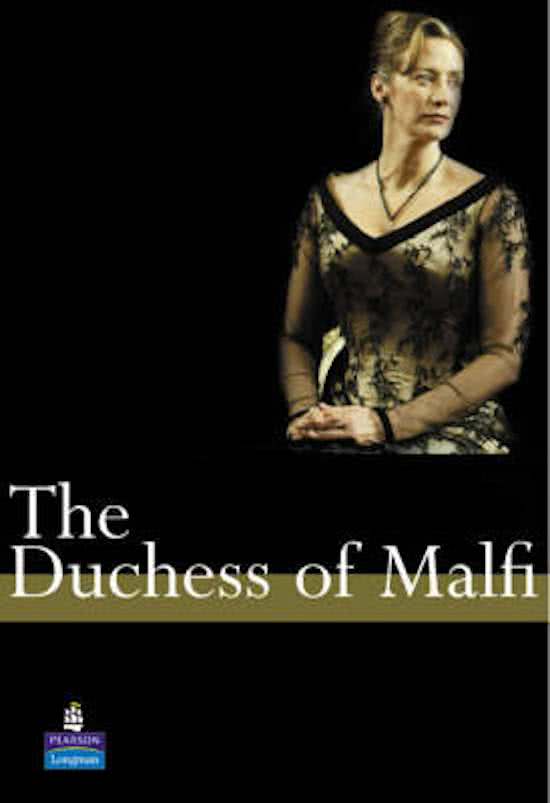‘Appetite – whether for power, knowledge, sex or money – is
always a destructive force.’
In light of this view, discuss ways in which writers present appetite. In your answer, compare one
poetry text and one drama text from the list above.
Word count: 2,192
Through the suggestion that desire is an inevitable component of the human condition, both Milton
and Webster similarly explore the various forms of appetite within ‘The Duchess of Malfi’ and
‘Paradise Lost’. Milton, writing within the context of Christian seventeenth century England, is
surrounded by a Puritan framework. Using the relationship of Adam and Eve as a forerunner of all
male-female relationships, Milton exposes the different appetites of the genders and the
consequential destruction and post-lapsarian state of Paradise. In contrast, Webster’s ‘The Duchess
of Malfi’ is written within the context of Jacobean theatre. Webster similarly explores the
destructive nature of appetite, a typical feature of the Jacobean stage, as the characters’ desire for
liberation, power, knowledge or sexual desire acts as the respective character’s hamartia.
As expressed through ‘Areopagitica’ (1644), Milton clearly believes it is our God given “freedom to
choose” that makes us human. Therefore, Eve’s desire and choice to eat the forbidden fruit, and the
consequential post-lapsarian world, is simply the result of the human condition. Perhaps Milton felt
the need to “justify the ways of God to man” through ‘Paradise Lost’, as despite His gift of liberty of
liberty to man, God’s punishments seem contradictory. Milton’s authorial role within Paradise Lost
echoes his political role of Secretary for Foreign Languages, appointed in 1649 for his enduring
support of Cromwell’s commonwealth. The political position involved acting as the voice of the
English revolution to the world at large, Milton’s role of the narrator in ‘Paradise Lost’ adopts a
similar importance; interrupting the “Rural repast” to mark the Eden’s destruction. Although
Milton’s pre-lapsarian presentation of Adam and Eve’s relationship seems to express the same
qualities as the Duchess’ and Antonio’s. The initial union of Adam and Eve is presented as the idyllic
relationship between the genders. However, Book IX introduces the first disagreement between the
two, regarding the nature of labour in the Garden of Eden. The trajectory of the argument exposes
the vulnerabilities that make both Adam and Eve susceptible to the Fall- Eve in her desire to define
her autonomous identity, and Adam in his act of sympathy. Eve, “sever’d from [Adam]” as a “lifeless
rib”, perhaps has the same desire as the Duchess; an appetite for liberation from patriarchal
authority. Feminist critics, such as Sandra M. Gilbert focus upon Eve’s subjection to Adam. Marking
the hierarchy of the Garden of Eden and Eve’s inferiority, Adam is created in the image of God while
Eve is created in the image of man. As “Daughter of God and Man”, Eve is defined by her
relationship with men. Deprived of autonomous identity, Eve is the patriarchal ideal of womanhood
and trained to be obedient to male power. A critical appreciation may suggest that Eve’s first
mistake, which leads to her eventual temptation and destruction, is attempting to disrupt the
‘natural’ and idyllic order of Paradise via the suggestion “let us divide our labours” and working
independently without Adam. Perhaps Eve’s “freedom to choose” is repressed by Eden’s patriarchy,
as is the Duchess’ choice of husband is ostensibly dominated by her brothers, therefore silently
persuades Eve’s eating of “this fruit divine”. Milton’s use of “greedily she ingorged without restraint”
could imply that Eve’s appetite for freedom is heightened as the “great Forbidder” controls her
actions.
Both Milton and Webster present an appetite through the typically Jacobean Machiavellian villain.
‘The Duchess of Malfi’s Cardinal, a respected and highly-ranked member of the Roman Catholic





